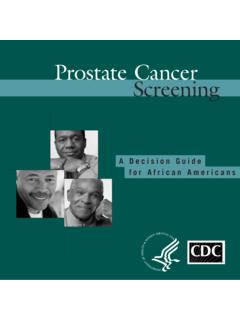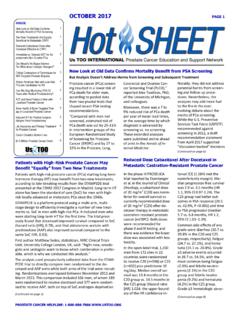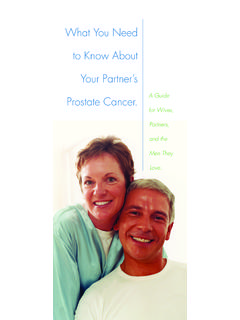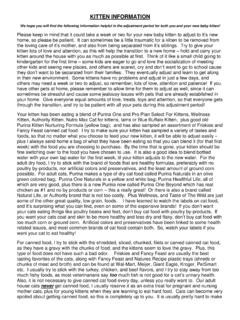Transcription of Hope Recovery Support - Us TOO
1 hope Recovery Suppor tINSIGHTS TO help YOU LIVE LIFE RESTORED ..after prostate cancer surgeryAmerican Medical Systems, Headquarters10700 Bren Road WestMinnetonka, MN 55343 USAP hone: 952 930 6000 Fax: 952 930 (09/09)Every year, more than a quarter of a million men are diagnosed with prostate cancer. It is the most commonly diagnosed cancer in American men today. If detected early, prostate cancer is usually many men, you have undergone surgical treatment for your prostate cancer. Advances in surgical techniques have allowed surgeons to successfully operate on a growing number of patients, and today surgery offers the greatest chance for cure for organ contained prostate cancer.
2 As you move into the Recovery phase of your journey, we have put together this resource kit designed to provide you with important information about what to expect after your surgery, tracking your progress, Support options, and other important things to know during the coming 30 31 POST-SURGERY331 The issues surrounding prostate cancer aren t limited to diagnosis and treatment. There are important physical and emotional considerations to deal with after surgery as well. It is likely you have many questions about the coming weeks and months.
3 Your health care team will provide you with detailed instructions for post-operative care, but this section provides general information about how you may be feeling and what you might expect after your You are beating back cancer, so hold your head up with dignity. LV-TX You are beating back cancer, so hold your head up with dignity. LV-TX Foley CatheterWhen you are discharged, you will have a tube (Foley catheter) in your urethra coming out the tip of your penis to drain urine while the bladder recovers. The catheter will generally be in place for approximately one to three weeks, and must be properly cared for.
4 You will be taught how to take care of the catheter and empty the bag periodically. If the catheter falls out or there is inadequate drainage, you should contact your health care team immediately and follow their instructions. You will be advised on removal of the catheter. Some physicians request that you make an appointment to have the catheter removed in the office, while others will provide instructions for you to safely remove it on your own. IncisionDepending on the type of surgery you had, you may have multiple small incisions in your abdomen or one large incision and you may have a dressing.
5 Some men will have this dressing removed on the day they are discharged or it may be removed at a later time. Your health care provider will review with you how to care for your incision site at home. Most men are able to shower as soon as the incision drains are removed, but are advised against extensive soaking in water, such as a bath, hot-tub or swimming pool. Call your physician if your incision becomes infected or re-opens. Signs of infection are fever, redness, swelling, and/or a puss-like patients generally experience some discomfort after surgery, and ibuprofen or acetaminophen will usually help alleviate any pain.
6 Your physician will discuss your pain management needs, and may provide a prescription for additional pain medication if needed. If you require additional pain medication it is likely this medication will be a controlled substance and require a written prescription. This type of medication cannot be telephoned into the pharmacy. It is generally advised to abstain from alcohol when on pain medications. An oral antibiotic may be prescribed, and a stool softener may be suggested to ensure that bowel movements don t cause additional strain on your surgical to your doctor about resuming any other prescription medications after your surgery.
7 Most can be resumed upon men are able to resume their previous diet following surgery, but your doctor will provide you with any specific requirements. Eating plenty of fresh fruit and vegetables and increasing your fluid intake can help keep your stools soft for comfortable bowel movements. 6 General ActivitiesPatients are generally advised to refrain from driving for a period of time, typically one week after surgery. After that, you can likely resume most of your normal routines, although strenuous and jarring exercises (such as heavy lifting, cycling, motorcycle riding and horseback riding) should be avoided for a full six weeks or as your doctor advises.
8 In addition, abstain from sexual activity according to your doctor s advice. This can vary from a few days to several weeks to a month or so following removal of the catheter. Depending on the type of work you do, you may be able to return to work within two to three weeks after surgery. Talk to your doctor about what s right for are encouraged to walk and climb stairs as much as possible during your Recovery and refrain from sitting in one position for longer than 45 minutes. Patients should not take baths or swim until the incision(s) is healed, generally around four weeks.
9 Showering may be permitted 48 hours after the the catheter is removed, your doctor will advise you on beginning regular pelvic floor/Kegel exercises. These are designed to help strengthen the muscles of the pelvic floor below your bladder. This can lead to improved continence and sexual Prostate cancer is a journey, and I finally feel like I m in the driver s seat again. Recovering Bladder Control and ErectionsIn order to remove the cancer, the mechanisms in your body that help control your urine flow and ability to get an erection may be damaged.
10 Most men are understandably concerned about their ability to regain bladder control and erections following their prostate surgery. While men often experience incontinence (leaking of urine) immediately following surgery, the leakage usually tapers off within weeks or several months. When incontinence persists beyond several months, you should consult your doctor. The good news is that there are more treatment solutions than ever before. The same is true for erectile dysfunction (ED). ED is known to be a potential complication following prostate cancer treatment.













